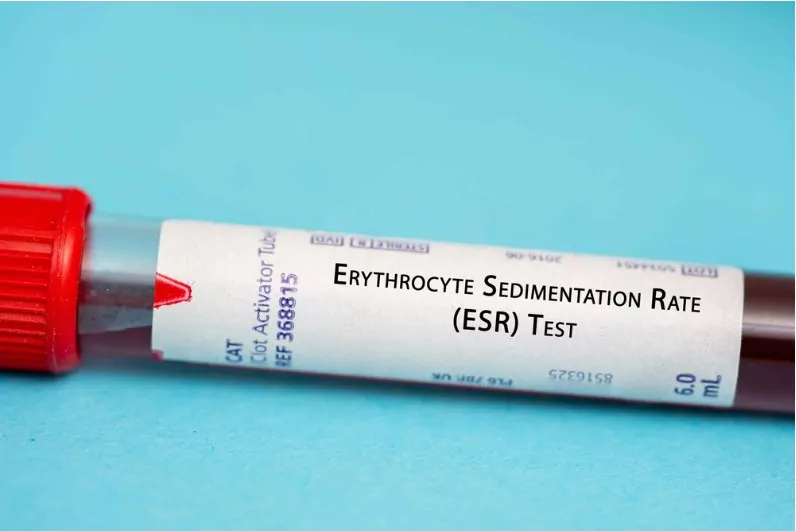How To Reduce ESR In Blood? Home Remedy

Erythrocyte Sedimentation Rate (ESR), also known as Sed Rate, is a simple and non-specific test used in medical diagnostics to gauge the presence of inflammation in the body. An elevated ESR can indicate various conditions, including infections, malignancies, and autoimmune diseases. However, it’s not a definitive diagnosis tool but an indication that further investigation is required. ESR can be influenced by several factors, including diet, lifestyle, and general health status. This blog post will delve into natural remedies and lifestyle changes on how to reduce ESR in blood that can potentially help reduce ESR levels. It’s important to remember that while these home remedies can assist, they’re not substitutes for professional medical advice.
1 Healthy Eating Habits
A healthy diet is one of the key elements that can help control ESR levels. Consuming anti-inflammatory foods while avoiding inflammatory ones can significantly impact your overall health and potentially lower your ESR levels.
- Anti-Inflammatory Foods: Foods rich in antioxidants and anti-inflammatory compounds include fruits, vegetables, whole grains, nuts, and seeds. Berries, cherries, oranges, and tomatoes are high in Vitamin C, which is known for its anti-inflammatory properties. Leafy green vegetables like spinach and kale are packed with vitamins and minerals that can help lower inflammation. Whole grains, like oats and brown rice, contain fibre, which helps reduce the level of C-reactive protein, a marker of inflammation in the blood.
- Omega-3 Fatty Acids: These are found in fatty fish like salmon, mackerel, tuna, and sardines. They are also present in walnuts, flaxseeds, and chia seeds. Omega-3 fatty acids are known to decrease inflammation and could potentially reduce ESR levels.
- Avoid Inflammatory Foods: These include processed foods, foods high in sugar, refined carbohydrates, and unhealthy fats. Consuming too much red meat, fried foods, and sugary beverages can lead to inflammation, thus potentially elevating your ESR levels.
2 Regular Exercise

Regular physical activity is another effective way to reduce inflammation in the body. Engaging in at least 30 minutes of moderate-intensity exercise most days of the week can lower the risk of developing inflammatory diseases. Exercise reduces inflammation by regulating the immune system and reducing fat tissue, which produces inflammatory substances. Activities could include walking, cycling, swimming, yoga, or any form of exercise that suits your lifestyle and preferences.
3 Adequate Hydration

Drinking plenty of water daily helps detoxify the body by flushing out toxins, which could otherwise lead to inflammation. Water also helps transport nutrients to cells and ensures proper cellular function, which could indirectly help control inflammation and, thus, ESR levels.
4 Proper Sleep and Stress Management

Chronic stress and lack of sleep can lead to systemic inflammation, thus increasing ESR levels. Therefore, ensuring adequate sleep and managing stress through methods such as meditation, deep breathing, yoga, or other relaxation techniques can help control inflammation and potentially reduce ESR levels.
5 Natural Anti-Inflammatory Substances
- Turmeric and Ginger: Both turmeric and ginger are known for their anti-inflammatory properties, mainly due to a compound called curcumin found in turmeric and gingerol in ginger. Including these spices in your diet or taking them as supplements (after consulting with a healthcare provider) can help reduce inflammation.
- Garlic: Garlic contains a substance called allicin, which has potent anti-inflammatory and antioxidant properties. Regularly including garlic in your meals could potentially help lower ESR levels.
- Green Tea: Green tea is rich in antioxidants and has anti-inflammatory properties. Regular consumption of green tea may lower inflammation and help manage ESR levels.
6 Healthy Weight Maintenance

Obesity or being overweight can increase the risk of inflammation, thus possibly raising ESR levels. A balanced diet and regular exercise, as previously mentioned, can help achieve and maintain a healthy weight, potentially lowering ESR levels.
7 Limit Alcohol and Avoid Smoking

Excessive alcohol intake and smoking can increase inflammation in the body, potentially causing a spike in ESR levels. Therefore, moderation in alcohol consumption and cessation of smoking can be beneficial for managing ESR levels.
8 Prebiotics and Probiotics
A healthy gut contributes significantly to overall health and can play a role in controlling inflammation. Consuming prebiotic foods like onions, bananas, and oats, and probiotic foods like yoghurt and sauerkraut, can help maintain a healthy gut microbiome, potentially reducing inflammation and helping control ESR levels.
9 Regular Health Check-ups
Regular medical check-ups can help detect potential health problems early, including those that might cause elevated ESR levels. By managing these conditions early, it’s possible to prevent a rise in ESR levels.
10 Wrapping Up
While these home remedies and lifestyle changes can help reduce inflammation and potentially lower ESR levels, it’s crucial to remember that they are not a substitute for professional medical advice or treatment. If your ESR levels are high, it’s essential to consult with a healthcare professional to determine the underlying cause and appropriate treatment.
Also, not everyone with a high ESR level will experience symptoms or have an inflammatory condition. Some people may naturally have slightly higher ESR levels without any underlying issues. That’s why it’s essential to understand your body, its responses and to have open conversations with your healthcare provider.
In summary, maintaining a healthy lifestyle with a balanced diet, regular exercise, proper hydration, and sufficient sleep can all contribute to reducing inflammation and possibly controlling ESR levels and purify blood. These practices, coupled with regular health check-ups and medical consultations, can help maintain optimal health and wellness.
Disclaimer: This blog post is for informational purposes only and does not constitute medical advice. Please consult with a healthcare professional for any health concerns.
Community Q&A
About This Article
This article has been viewed 480 times.



